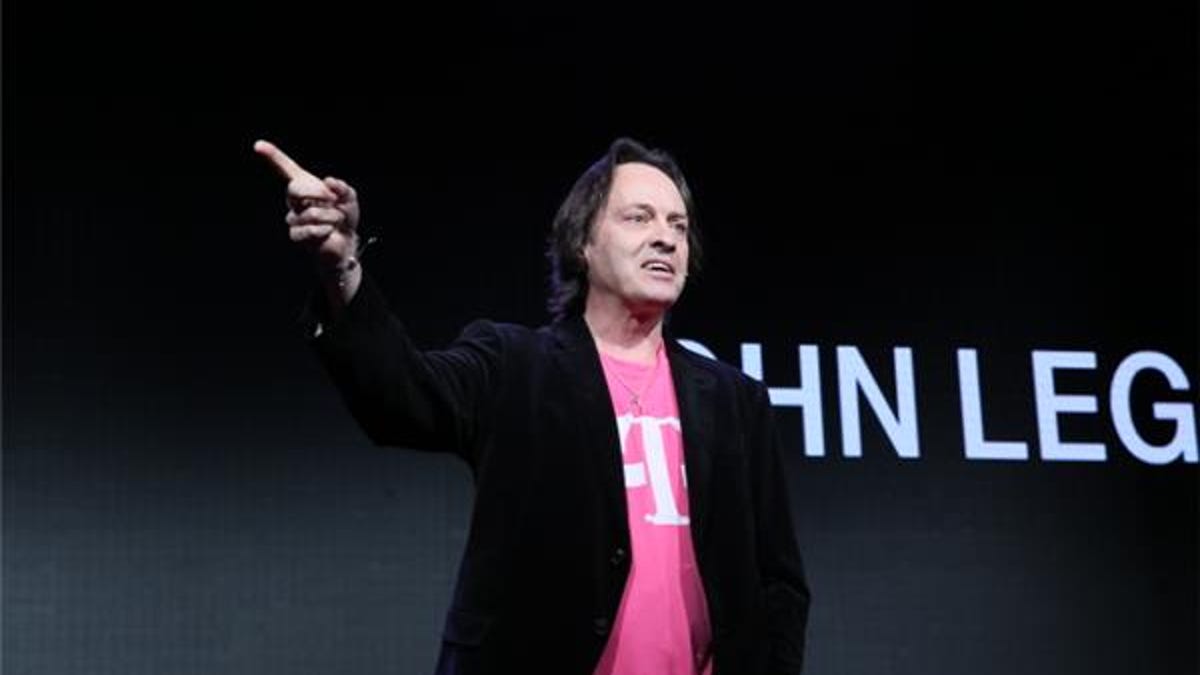T-Mobile CEO throws cold water on Sprint take-over rumors
CEO John Legere says T-Mobile is positioning itself for a long life as an independent brand, sending the signal that the company is not interested in teaming up with competitor Sprint.

T-Mobile CEO John Legere said that his company is not interested in being gobbled up by another competitor looking for more wireless spectrum. Instead, Legere and his team are focused on shaking up the wireless industry with a series of bold pricing and marketing moves.
At the end of last year, rumors began floating around that Sprint, the third largest carrier in the US, was putting together a proposal to buy T-Mobile, the fourth largest carrier. Even combined, Sprint and T-Mobile would still have fewer customers than either AT&T or Verizon Wireless. Rumors suggested that the company, now owned by Softbank, was planning to offer roughly $20 billion for T-Mobile.
During the company's press conference at the Consumer Electronics Show in Las Vegas on Wednesday to announce its next phase of its "UnCarrier" strategy, Legere put those rumors to rest when he answered a question about the rumored merger with Sprint.
"The consolidation in the industry has been about spectrum," he said. "All the rumors are about spectrum. But they're spectrum with no legs. The T-Mobile brand and people will stay. How that plays out remains to be seen."
Legere said that T-Mobile plans to continue pursuing the purchase of more spectrum to build out its network on its own. On Monday, the company announced an important deal with Verizon Wireless to swap T-Mobile's higher frequency spectrum for lower frequency spectrum owned by Verizon Wireless. T-Mobile plans to use this lower frequency spectrum to build its network in rural and suburban areas while also improving in-building coverage in existing urban markets.
"There are options in the industry in the future that would provide opportunity," Legere continued. He implied that it's more beneficial for T-Mobile's future to remain independent.
"The US needs a change agent or maverick," he said.
Legere said he doesn't see limitations on T-Mobile's potential as an independent provider. He said the company could become the third or second biggest carrier, and he is even shooting to become No. 1.
"It won't happen this year or in two years," he said. "But we are playing hard."
No need to merge
T-Mobile knows all too well the pain a failed merger can inflict on a company. After AT&T abandoned its $39 billion bid to acquire T-Mobile in late 2011, Legere said T-Mobile was like an engine that went dead. The carrier lost focus, stopped upgrading its network, and lost hundreds of thousands of customers. But Legere said the people working for T-Mobile were good. The company also had a lot of cash, some useful wireless spectrum, and a brand, though tarnished, that had potential. So when he came into the role of CEO he knew he had to shake things up.
And shake them up he did. The company launched its UnCarrier strategy in March in an effort to end pain points for customers.
"When I talked with customers, I couldn't believe how contemptuous people were with their carriers," he said. "I took that on for our company. Our company was going to be different from the other carriers."
First, T-Mobile ended contracts. Then it introduced an early upgrade plan. After that it introduced a plan to offer free roaming for customers traveling internationally. The company has seen great success with these new initiatives, adding more than a million new customers three quarters in a row for a total of 4.4 million new customers in 2013.
Competitors have responded to T-Mobile's moves. AT&T and Verizon Wireless introduced their own early upgrade programs last summer. And in December, AT&T revised its wireless plan pricing. Like T-Mobile, AT&T now offers a plan in which customers can unbundle the cost of their subsidized device from their monthly service, effectively giving customers who already own their phones a discount on their monthly service.
Last week, AT&T said it would pay up to $450 to existing T-Mobile customers who want to switch to AT&T. And AT&T isn't the only carrier responding to T-Mobile's aggressive moves. On Tuesday, Sprint announced its new "Framily Plan," which allows people to include up to 10 individuals on a single family plan and get up to a $30 discount on the total service. When at least seven people sign up for a single plan, each individual will only have to pay $25 for unlimited voice, text messaging, and up to 1GB of data.
With competitors on the defensive, it's unlikely regulators would allow T-Mobile to exit the market via an acquisition by a fellow competitor. Legere's remarks about playing for the long-haul seemed to underscore this reality.
Of course, this doesn't mean that T-Mobile might not entertain an offer from a company other than its three biggest competitors. It's possible the company could accept and get regulatory approval for a deal with a company outside the industry, such as Dish Network. Satellite provider Dish has been gobbling up wireless spectrum and has also been on the look out for a potential partner to help build a network. Another possibility is that another large company may simply buy out Deutsche Telekom's controlling stake in T-Mobile. The German parent of T-Mobile has made no secret of wanting out of the US market.
In any case, Legere and his team appear to be playing its hand for the long term.

